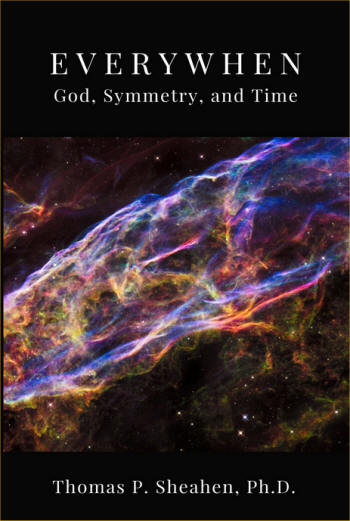Catholic Medical Quarterly Volume 72 (4) November 2022
Book Review
Everywhen. God, Symmetry, and Time
by Thomas P. Sheahen, Ph.D
En Route Books and Media
Reviewed by Dr Pravin Thevasathan
 I
really enjoyed reading this book. The author has forty five years of
experience as a research physicist. His love of science and the Catholic
faith shines through.
I
really enjoyed reading this book. The author has forty five years of
experience as a research physicist. His love of science and the Catholic
faith shines through.
As we advance from Newton to Einstein, what we see is the development of a symmetrical pattern. Time and Space have a relationship that earlier scientists were not aware of. The laws of physics have a beautiful symmetric pattern. Science is not something random. Everything is ordered. There is something stupendous going on here because it could have been otherwise.
But if everything was random, it would not have been possible for us to have such things as the laws of science. The very fact that the universe is so splendidly ordered suggests the existence of God who created space and time.
When atheists like Dawkins asks the question: "who created God?", the assumption is that God himself is in time. This suggests the superiority of time over God, and this is not the case.
The Bible teaches us that God is superior to space and time. The world of physics has shown that there is a starting point to creation. This was deeply embarrassing for the atheists! So, they decided to create a fiction: the multiverse. That is one way to come up with one random universe that could sustain life. There is no proof whatever for the existence of this multiverse.
Although science and faith complement each other, science is not rooted in religion. The Bible teaches us how to go to heaven, not how the heavens go. Our limited minds cannot understand the mind of God. Stephen Hawking famously tried doing so and came up with the idea that gravity could explain everything. Which explains nothing. For Hawking, we are in existence by accident. There is no purpose in life.
Can we turn science into an idol? I attended a lecture many years ago given by the distinguished priest-scientist Stanley Jaki. The take home message was that science is limited to measuring quantity. You cannot derive a set of moral beliefs from science alone. Love, beauty, truth, and goodness are beyond science but not opposed to it. In the ninetieth century, classical mechanics appeared to say that everything in nature is determined in advance. Science, it was suggested, can explain everything. How wrong they were. As science advances, the more we come to realise how little we actually know. They are surely wise who, like Socrates, recognize their limitations. "I know nothing" said the Fawlty Towers character Manuel. Such is the wisdom of fools.
I do have some reservations. The author appears to suggest that Teilhard de Chardin was someone who showed that science and theology complement each other. Unfortunately, Teilhard appears to have fallen into the errors of pantheism and the denial of original sin. There are other problems with Teilhard. The great Catholic philosopher Dietrich Von Hildebrand was scathing of his theories.
Having said that, I think this book is very good indeed. We have one more highly qualified scientist telling us that Christians have nothing to fear from science. Indeed, science and religion complement each other beautifully.
